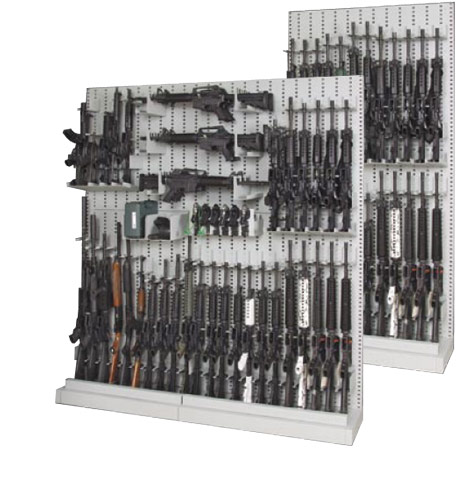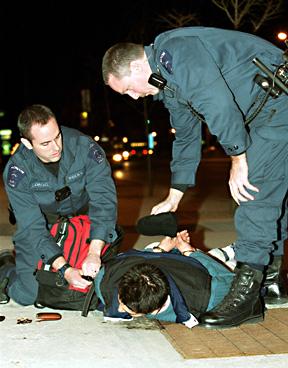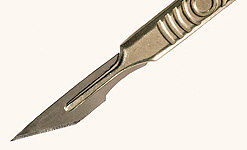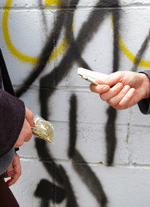Paradise City:Introduction to Paradise City
The City[edit]
In the year 2106, Paradise City is a sprawling Arizona metropolis lying in the heart of the Mojave desert. Great wealth coexists with great poverty here and for most citizens, violence is simply a part of life. The city was founded in the late 2030s, in order to ease the United States’ population pressure and today is one of the most populous cities in the country.
Government: Paradise receives little support from the state and federal governments and is mostly autonomous. The city is a democracy, although hardly anyone bothers to vote.
Corporations: Paradise is ultimately controlled by the corporations – money is power. If the corporations do not control a section of the city, it is probably because that section is not worth owning.
Police: Although state police are responsible for keeping the roads to Paradise open, the city has its own police force to handle crimes committed within the city limits. CityPol is broken up into five semi-autonomous forces – Central CityPol, Eastside CityPol, Northside CityPol, Southside CityPol and Westside CityPol.
Technology: Paradise City has a GURPS Tech Level of 9.
Life in Paradise[edit]
There should be a fine sociological treatise here. Instead, it is much quicker to say that Paradise City is firmly ripped-off from the cities of published RPGs of the "cyberpunk" genre - including, but not limited to, the Night City of R.Talsorian's Cyberpunk 2020, the Seattle of FASA's Shadowrun, and the One-And-Twenty of Steve Jackson Games' GURPS Cyberworld. So instead of telling you about the haves and have-nots, algae dinners and urban alienation, it would be more useful to focus on two areas where Paradise City differs signficantly from cities in the most popular "cyberpunk" rpgs - gun control and attitudes to cyberware.
Weapons in Paradise[edit]
What the Law Says[edit]
Federal law states that a citizen may own and carry a weapon of LR 3, such as an auto pistol, provided that they register the weapon with the federal government, and pay a license fee equal to 10% of the cost of the weapon. A citizen may carry the weapon concealed if they have a concealed weapons permit, which is free but requires government approval. Weapons with an LR of 4 or above are not regulated. Citizens have a legal duty not to carry a weapon onto private property if instructed not to by the owner. The instruction can be as a simple as a sign by the door. The government may issue permits to allow organizations to arm their members with weapons of LR 2, such as submachine guns.
The Reality[edit]
In reality, what weapons you can carry varies enormously depending on what part of the city you are in, ranging from nothing at all to auto rifles. Area descriptions under Urban Geography will describe the specific weapon culture in that area – read them carefully before entering an area, as it could mean the difference between life and death. As a rule of thumb, the more important, prosperous or privately-owned an area is, the tighter the restrictions are likely to be. Corporate offices will have a “No Weapons” sign at every door and police in middleclass neighborhoods will arrest someone for having a visible weapon. On the other hand, you can carry an auto-pistol on your hip in the seedier parts of the downtown commercial district - although even a very rough bar is likely to demand that handguns be left at the door. Police in poor neighborhoods control weapons as strictly as they can. Enforcement ranges from arresting anyone found to be carrying a weapon to taking no notice of anything short of a squad-support weapon. Suffice to say that any neighborhood in which the police won’t stop you from walking down the street carrying a submachine gun has been effectively ceded to the gangs – who will have their own unique opinions about what kinds of weapons it is alright to carry into their territory.
Registration and Licensing[edit]
Very few people bother to register or license their guns, as the police rarely care if a weapon is registered or licensed. A police officer can arrest you for not having a license, but unless you are in a particularly nice neighborhood, any officer who asks about your gun license is already looking for an excuse to bust you. It is unlikely that an officer who is looking for an excuse to bust you won’t be able to find one (or invent one!).
Concealed Weapons Permits[edit]
The federal government will only issue permits to government security personnel, or to the security personnel of major corporations. In practice, the police generally don’t care if you hide your weapon or not – they either care that you have it in the first place or they don’t.
“Unregulated” Weapons[edit]
In theory, weapons of LR 4 and above are not regulated. In practice, like “regulated” weapons, enforcement ranges from complete lack of regulation to complete bans, depending on the weapons culture of the local area.
Private Property[edit]
The law allows owners to forbid some or all weapons from their private property. Owners generally don’t want violence taking place on their property, so will tend to make the rules as strict as they can without driving away wanted customers. All businesses are private property as is any land owned by a corporation, so many places have special restrictions.
Corporate Security[edit]
The government often uses its control over heavy weapons permits to make it legal for corporate security troops to carry weapons of LR 2, such as submachine-guns.
Cyberware in Paradise[edit]
Corporate culture and street culture have different attitudes towards cyberware.
Cyberware in Corporate Culture[edit]
In corporate culture, appearance is everything. They don't care what you are made of, they care about how you look, and so owners of cyberwear are judged by the appearance of their cyberware rather than the quantity. Corporate culture divides people into the following vague unofficial castes based on their use of non-natural looking cyberware.
Angels: Angels are rich persons who modify their bodies in strange ways in order to be dazzling, artistic and cool. Cyberware that would be considered grotesque and disgusting if it were a part of someone else is accepted and even admired in an angel. Unnatural cyberware of a useful nature is considered to be very uncool, and unless it is unique and experimental, is liable to disqualify the owner from angel status. Angels do not make appropriate PCs.
Pure-Strain Humans (Also “PSH”): A “pure-strain human” is someone who has no non-natural looking cyberware. Most of corporate middle-management and almost all of corporate upper-management is composed of pure-strain humans. Pure-Strain Humans generally look favorably on cyberware per se, provided that it looks like a natural part of the body. Attitudes to angels varies from raised-eyebrows to hero-worship.
Cyberpunks: Anyone with non-natural cyberware who is not an angel is considered a “cyberpunk” – which means that almost everyone with non-natural cyberware falls into this category. The word has connotations of criminality, viciousness and renouncement of humanity. The word “cyberpunk” is officially considered offensive when applied to a colleague, but is in common use among pure-strain humans all the same. There are various castes of cyberpunk.
Androids: Androids are corporate employees who have non-natural cyberware that is legitimately related to a respectable office job – such as chip slots, computer interfaces and cell-phone implants. Androids are regarded by pure-strain humans with a mixture of revulsion and grudging admiration. It is acknowledged that they can be excellent employees, but they are regarded as having given up a degree of their humanity, which makes them scary and icky. Like the word “cyberpunk”, the word “android” is officially considered offensive when applied to a colleague, but is in common use among pure-strain humans all the same.
Orc: Orcs are uniformed military, police or security personnel with visible cyberware that is legitimately related to their job. Orcs are frightening and disgusting, but are useful enough to be tolerated. They are rarely assigned to patrol nice neighborhoods. In fact, Orcs who cannot pass for prosthetics usually cannot walk around in good corporate neighborhoods out of uniform without being hassled by police.
Prosthetics: Prosthetics are individuals with visible cybeware that can pass for medically necessary prosthetic replacements – such as bionic arms, legs and eyes. Corporate culture regards them with revulsion, but will tolerate them if they are working in respectable jobs. A prosthetic will rarely be promoted to a management position without becoming an android or pure-strain human first. Anyone who clearly could afford to replace their non-natural parts with natural parts but does not is not considered a prosthetic but a freak.
Freaks: Freaks are individuals with visible cyberware who cannot pass for an angel, an android, an orc or a prosthetic. They will be treated as an outsider and suspected of being an anti-social criminal. A freak whose non-natural cyberware is hidden when they are clothed is called a “coocoo”. Coocoos are thought of as being particularly grotesque for the very fact that they can pass for good corporates.
Psychos: Psychos are freaks with visible cyberware that looks like it was designed for combat. Psychos will be suspected of being psychotic anti-social criminals. They are seen as people who have traded in their humanity for the ability to kill.
Cyberware in Street Culture[edit]
Street culture does not recognize the classes of corporate culture but has its own system for classifying people by cyberware. The word “cyberpunk” is used for anyone who has cyberware and who is either a criminal or has no boss. The word has connotations of dangerousness and a lack of respect for the law – which can be either a good or a bad thing depending on the company. Anyone with visible cyberware will generally be thought to have traded in some of their humanity for an edge – the less human they look, the less human they will be assumed to be. They will be suspected of being a criminal, unless the ware is obviously suited for a normal, legitimate, non-violent occupation. Anyone with visible cyberware that would give them an edge in combat will be assumed to either fight for a living or fight for fun. There is no general prejudice against individuals with natural looking cyberware, although anyone with known combat mods will obviously be frightening.
The Black Market[edit]
The difficulty of finding and purchasing illegal items in an area will depend greatly on the particular item and area involved. At its simplest, the process will require a successful roll against Streetwise to locate a seller, and then whatever rolls or role-playing the GM decides is appropriate for the situation. Finding a Seller: The GM will assign the area a Control Rating, depending on police tolerance of the desired items. Items with a Legality Rating equal to or higher Control Rating should normally be obtainable without a roll. Common items (including weapons of LR 1 or higher) with a Legality Rating lower than the Control Rating will have a penalty to the Streetwise roll equal to twice the difference between the Legality Rating and the Control Rating. For example, if the Area Control Rating is 2 and the weapon’s Legality Rating is 1, the roll would be Streetwise -2. There will frequently be much heavier penalties to the Streetwise roll – some things are hard to find and some neighborhoods are very hard to find things in. For example, in some corporate neighborhoods, it is effectively impossible to obtain many illegal items (or obtaining them would be an adventure in itself). Criminal transactions are always unpredictable affairs and the involvement of gangers in organized crime does not make them less so. However, gangs rarely sell items with an LR lower than the CR -1. If you are Downtown and suddenly want to purchase an assault rifle, a seller is less likely to be a ganger than to be a trusted member of an organized crime syndicate.







